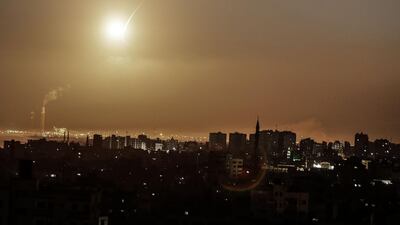Israeli jets struck 25 targets in Gaza overnight in response to a Palestinian rocket barrage in which dozens of missiles were launched at Israel, risking a new escalation in a conflict that has had three wars in the last decade.
The flare-up comes after months of weekly rallies that have turned violent, with Israel killing more than 120 protesters and wounding thousands, many who were unarmed and far from the border fence. The protesters have called for a return to ancestral lands now in modern-day Israel and an end to a crippling 11-year siege of the coastal enclave by both Israel and Egypt.
About 30 projectiles, including rockets, were fired overnight from Gaza towards Israeli territory.
The Israeli military said it hit bases linked to the territory's rulers Hamas in response to the rocket fire. Its Iron Dome missile defence system intercepted four rockets, it added, while an unspecified numbers of them fell into Israeli territory.
Two Hamas security men were slightly hurt in one air strike in the southern Gaza Strip, residents said. No casualties were reported in Israel after one of the most intense recent barrages of fire.
It broke what was a de-facto ceasefire that had held since the end of May, when Gazans launched their biggest mortar and rocket barrage since the seven-week war in 2014.
Air raid sirens and Israeli phone alert applications sounded throughout the pre-dawn hours.
Fawzi Barhoum, a spokesman for Hamas, praised the attacks calling them "a legitimate right that bombing is met with bombing," but did not take responsibility for them.
Some rockets exploded inside Israel damaging property. Channel 10 TV showed footage of Israeli houses and cars peppered with shrapnel and said one mortar exploded next to a kindergarten.
Israeli police said its bomb disposal unit dealt with a rocket that landed in a populated area.
"The Hamas terror organization targeted Israeli civilians throughout the night with a severe rocket attack and is dragging the Gaza Strip and its civilians down a continually deteriorating path," the military said.
The trading of fire took place days after Israel moved to strike against individuals who have flown kites and balloons with gas-soaked rags attached, sparking fires in southern Israel.
"If anyone thinks it will be possible to continue with the daily kites and fires, they are wrong," Defence Minister Avigdor Lieberman was quoted as saying by The Times of Israel on Tuesday.
In recent weeks, Palestinians have sent the kites across the Gaza border to set fire to arid farmland and forests, others have carried small explosive devices, in a new tactic that has caused extensive damage.
The mass demonstrations have taken place along the Gaza border since March 30 and the men sending the kites over the fence believe they have found an effective weapon.
Israel's hi-tech response and use of deadly tactics in confronting the weekly Friday protests have drawn international condemnation.
The Israeli-Egyptian blockade of the strip has caused an economic crisis and collapse in living standards there over the past decade. The UN says the territory will be "unlivable" by 2020.
______________
Read more
UN General Assembly blames Israel for Gaza violence
UN inquiry approved into killing of Palestinians at Gaza fence
Arab League demands international probe into Israeli crimes
______________
Meanwhile, the UN agency for Palestinian refugees is "weeks away from painful cuts" to its emergency assistance for Gaza and refugees elsewhere, because of an unprecedented gap in its budget of more than US$250 million (Dh918m), the UN Middle East envoy said Tuesday.
Nikolay Mladenov told the Security Council that in Gaza, "this would include a deferral of salaries to some of its workforce in July and the start of suspending core operations in August".
United States President Donald Trump's administration announced in January it was withholding $65m of a planned $125m funding instalment for the UN Relief and Works Agency (UNRWA). It released $60m so UNRWA wouldn't shut down, but made clear that additional US donations would be contingent on major reforms at the agency.
The US also withdrew from what it called a "hypocritical and self-serving" United Nations Human Rights Council on Tuesday over what it called chronic bias against Israel, a move activists warned would make advancing human rights globally even more difficult.
The council last month voted to probe killings in Gaza and accused Israel of using excessive force. The US and Australia cast the only "no" votes.
Palestinians are angered by what they say is a US bias towards Israel that has ended its role as an impartial mediator in the conflict. The Palestinian Authority said Saturday that US plans to resolve the Palestinian-Israeli conflict are "doomed to fail". The Trump administration is reportedly working on a peace plan for the decades-long conflict.
Mr Trump's special envoy Jason Greenblatt and adviser Jared Kushner on Tuesday met with Jordan's King Abdullah II in Amman to discuss the Palestinian-Israeli peace process. The meeting came less than a day after the Jordanian monarch hosted Israeli Prime Minister Benjamin Netanyahu in a short but rare visit.

